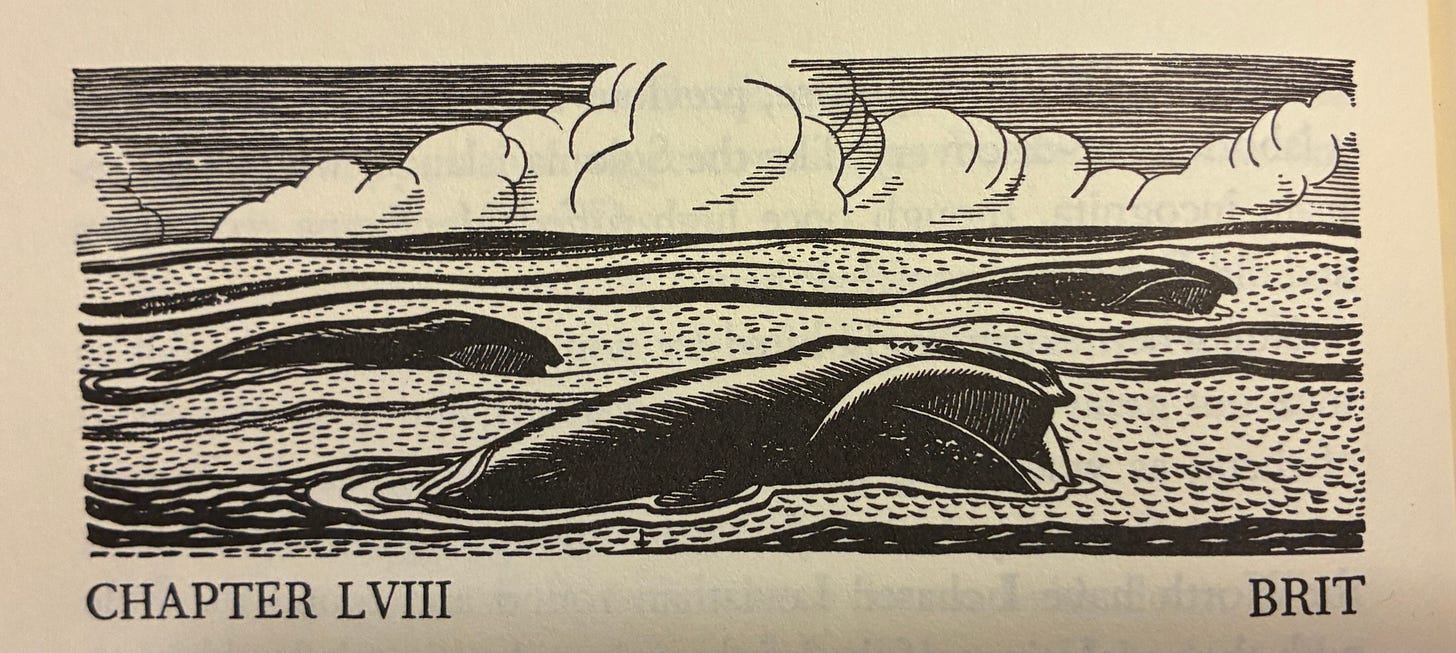All of It
Moby-Dick Day 2 | Introduce a symphony. Launch a ship. Grab a reader.
This is the second of what will will be sixty-odd posts about what I’m learning as a writer from Moby-Dick’s weirdly wonderful 135 chapters (plus front and back matter), as I read it aloud along with the writers and readers of The 24-Hour Room every weekday morning, over the course of the Fall. Today’s thoughts are inspired by Chapters 1 and 2, “Loomings” and “The Carpet Bag.”
But first, an invitation to writers of fiction, memoir (or anything in between) to participate in novelist and Best American Short Stories contributor Dave King’s upcoming Engines of Narrative workshop on Zoom at The 24-Hour Room, 9 Wednesday evenings, 10/8-12/17/25, featuring craft talks, literary fellowship and the chance to share and receive feedback on up to 45 pages of prose in a small group. Readers of this Substack can enroll for 10% off with discount code SUB-SUB-10
Mood. Voice. Irony. Poetry. Parallelism. The chiaroscuro range of high and low imagery, crass and fancy diction. Humor. Gallows humor. The imperative. The interrogative. The Snow Hill. The Carpet-Bag.
Which of these am I most excited by?
It’s wasn’t clear to me—until I realized that what that grabs me hardest in the opening is the sheer abundance. No single element makes the pages compelling. “Loomings” and “The Carpet-Bag” are a kind of symphony—or an overture to a symphony, really—that presages the grandness and complexity of the whole, the whale, the world, which belongs both to Ishmael and to me, a reader from Brooklyn 174 years after the publication of this strange and marvelous book, at once so postmodern and so old fashioned. Or maybe the better metaphor would be the swarm of “brit”— what we call krill—that Melville extols in Chapter 58 as the foundation of the marine food chain.
That’s the thing, then: All of it, the multiplicity, the contradictions, the richness. The tiny begets the leviathan, the ripple the great wave.
To return to the beginning, then: The imperative voice of the first sentence brings a reader in and sets the entire story in motion. “Call me Ismael” falls somewhere between an introduction, a demand and an invitation. It asks the reader to connect, and on a first name basis. We are going to be friends. I think a large part of the initial chapters’ appeal comes from this everyman quality Melville and infectious gregariousness of his narrator. In “Loomings” alone, there are ten sentences in the imperative mood, issuing a command or an instruction to the reader to do, say, think, see or feel something.
With that much attention, it’s hard not to be won over, but for me what finally clinches it is the way Melville pairs Ishmael’s gregariousness with candor about the leaden state of his soul. He handles Ishmael’s (and thus, it feels, my own) fragile mental health with such deftness. He acknowledges truths that are usually squelched, tells us straight away that darkness hangs overhead—suicide, pistols, coffins abound—all the while relentlessly cracking jokes. He makes light of horrors, but somehow without demeaning them. Yep, Melville suggests, it is just a little bit funny how f-ing depressed we all are, and how we all hope to soothe our souls by gazing at calming waters, and then, having failed at that, elect to engage in perilous, potentially lethal, aquatic activities such as signing on for two years before the mast. It’s funny, all right. Every kind of funny: Funny-sad. Funny-awful. Funny-odd.
All of it.
I’m so totally in for Melville and Ishmael’s Nantucket sleigh ride by the end ofChapter 2, because I couldn’t agree more. As different as I may be from Ishmael, he’s me, he’s my everyman, I’m him.
In my own writing, I’m just at the outset of a new story, and this is what I’m going to try for, to get it launched: a connection with the reader, a feeling of universality that’s nonetheless vivid and specific.
I’d love to hear from you in the comments about you will be trying to achieve in your work, today.
(And by the way, thanks to those who chimed in on my title question from yesterday’s post. It was a sweep for “The Quisling Authorities”!
Good writing!


